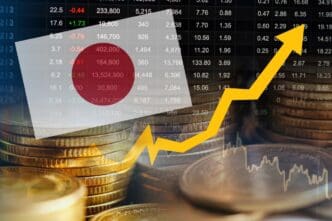Asian markets mostly experienced gains on Tuesday, mirroring a positive trend on Wall Street following President Donald Trump’s temporary relaxation of certain tariffs. The move comes amidst an easing of tensions in the U.S. bond market. Japan’s Nikkei 225 saw a rise of 0.8%, reaching 34,267.54, with significant contributions from automakers. Toyota Motor Corp. surged 4.7%, and Honda Motor Co. rose 3.9%. In the electronics sector, Sony Corp. increased by 2.4%, and semiconductor companies Tokyo Electron and Renesas gained 1.3% and 1.5%, respectively.
The Australian S&P/ASX 200 index grew by 0.2% to 7,761.70, and South Korea’s Kospi advanced 0.9% to 2,477.41. In contrast, Chinese markets were mixed; Hong Kong’s Hang Seng fell 0.3% to 21,364.72, and the Shanghai Composite decreased 0.2% to 3,257.72. Analysts suggest that the U.S. administration’s approach to tariffs has become somewhat unpredictable, with sudden policy shifts impacting market stability.
On Monday, U.S. stock indices reflected the easing tariffs. The S&P 500 increased by 0.8% to 5,405.97, the Dow Jones Industrial Average also gained 0.8% to 40,524.79, and the Nasdaq composite climbed 0.6% to 16,831.48. Technology firms like Apple, which rose 2.2%, and Dell Technologies, up 4%, benefited from the exclusion of smartphones, computers, and other electronics from the tariff list. This measure could prevent U.S. importers from raising prices or reducing profits.
The auto industry also saw potential relief, with Trump hinting at possible future pauses on tariffs for automotive companies. This drove General Motors up by 3.5%, and Ford Motor by 4.1%. However, the exemption on electronics is noted as temporary, contributing to ongoing uncertainty for consumers and businesses seeking to make long-term plans.
Financial markets have witnessed significant fluctuations, as investors attempt to navigate the erratic tariff policy. However, a moment of stability emerged as U.S. Treasury yields, which had been unusually volatile, began to settle. The yield on the 10-year Treasury decreased to 4.35% early Tuesday from a peak of 4.48% the previous Friday. This followed a Federal Reserve Bank of New York survey indicating stable or lowered expectations for long-term inflation among U.S. consumers, offering some reassurance to the Federal Reserve.
Meanwhile, U.S. crude oil prices rose by 20 cents to $61.73 per barrel, and Brent crude increased by 18 cents to $65.06 per barrel. The U.S. dollar appreciated to 143.09 Japanese yen, while the euro slightly declined to $1.1346.
Your World Now
The temporary relaxation of tariffs by President Trump provides a brief respite for consumers and businesses alike. For everyday consumers, particularly those dependent on electronics and automobiles, this could mean avoiding immediate price hikes, thus safeguarding household budgets in the short term. However, the uncertainty surrounding the permanence of these measures may continue to influence spending habits and consumer confidence.
For businesses, particularly importers and manufacturers relying on foreign components, the temporary tariff relief offers a window to adjust pricing strategies and supply chains without the immediate pressure of cost increases. Nevertheless, the unpredictability of U.S. trade policy underlines the necessity for companies to remain agile, potentially affecting long-term investment decisions and market strategies.
Overall, while the easing of tariffs may contribute to short-term market stability and consumer savings, the ambiguity surrounding future policies requires vigilance from both consumers and businesses as they navigate an evolving economic landscape.







